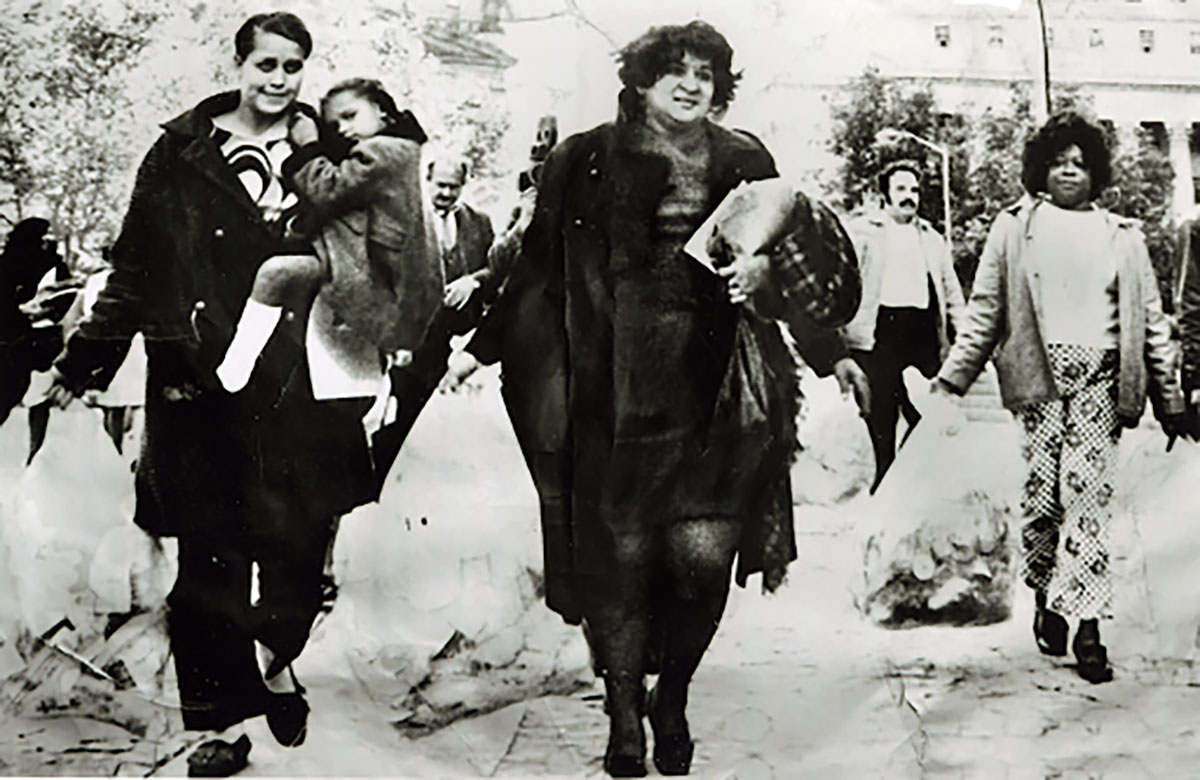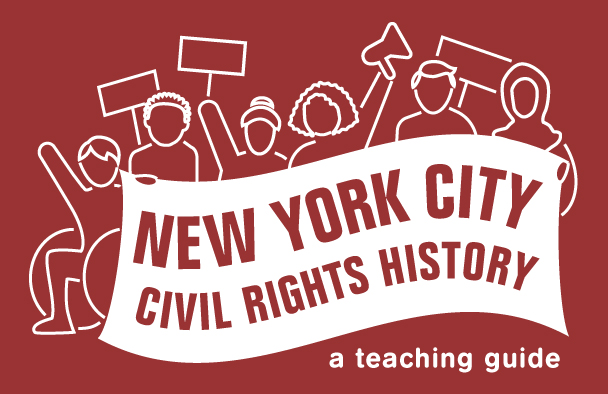You are here:
Evelina Antonetty and United Bronx Parents Protest School Lunch

Date: 1970
Caption: This photo shows Evelina Antonetty and two women, one carrying a child, walking across Federal Plaza in Manhattan and holding large plastic bags of food.

In 1969, parents in the South Bronx were concerned about what their children ate at school. A group of parents, mostly mothers, came to Evelina López Antonetty for help in addressing the issue. Antonetty and her organization, United Bronx Parents, agreed to help.1
In New York’s Board of Education, the Bureau of School Lunches was in charge of school food. The Bureau cooked food for the city’s schoolchildren in an old soup kitchen in Long Island City, Queens. Sandwiches put together in the morning dried out by the time they arrived at schools. Soups were watery and unappetizing. The prepackaged milk was even worse. It often turned sour after hours on unrefrigerated delivery trucks.2 School lunches could be an important source of food for many families. But poor quality meals meant many students threw their lunches away uneaten.
Black and Latinx parents sometimes felt uncertain about challenging school officials, many of whom were white men. But United Bronx Parents saw that school food was an issue Black and Puerto Rican parents, and especially mothers, were confident about. According to one mother, “The principal may know more about reading and teaching, but when it comes to food I’m just as much of an expert as he is.”3 Both Spanish-speaking and English-speaking mothers felt they were experts in feeding their children and demanded changes in the school lunches.
Evelina Antonetty was committed to parents deciding what issues they would fight for and how. Antonetty supported and coached the parents as they planned. They started by conducting an investigation into how school lunches were prepared and served, what the food was like, and what conditions existed in the cafeterias.4
On April 10, 1969, Antonetty and the parents staged a surprise political demonstration. They invited lawmakers to the UBP office. Once everyone arrived, Antonetty guided them onto a school bus which took them to P.S. 25. There, the parents and Antonetty offered the public officials the same meals students were forced to eat, in the same cafeteria where students had to dine.
The officials were repulsed by the food. There was chaos when someone spotted mouse droppings in the cafeteria. In fact, one of the city’s assemblymen in attendance got sick after eating the food. The parent activists had made their point.5 Very quickly, officials started investigations and demanded reform from the Board of Education.
Parent activism continued. After the visit to P.S. 25, invited the same officials to a model lunch - “un almuerzo escolar como debe ser” - “a school lunch like it should be.” Cooks on site prepared healthy food that was part of Puerto Rican and Black cultural traditions. And it cost the same as the unsavory food from the Bureau of School Lunches.6 Parents staged other dramatic events, like the demonstration pictured here, where parents carried bags of discarded school lunches.7
In the early 1970s, United Bronx Parents created its own free summer lunch program. Not long after, the city began to provide similar support for its children.8
-
To read more about United Bronx Parents, Inc. see Adina Back, “‘Parent Power’: Evelina López Antonetty, the United Bronx Parents, and the War on Poverty,” in The War on Poverty: A New Grassroots History, 1964-1980, ed. Lisa Gayle Hazirjian and Annelise Orleck (Athens: University of Georgia Press, 2011); Laura Kaplan, “United Bronx Parents and the Struggle for Educational Equality in the 1960s,” Theory, Research, and Action in Urban Education iv, no. 2 (Spring 2016), https://traue.commons.gc.cuny.edu/volume-iv-issue-2-spring-2016/1050-2/; and Lana Dee Povitz, Stirrings: How Activist New Yorkers United a Movement for Food Justice (Chapel Hill: University of North Carolina Press, 2019), chapters 1 and 2. ↩︎
-
Povitz, Stirrings, 33-35. ↩︎
-
Povitz, Stirrings, 58. ↩︎
-
Povitz, Stirrings, 36-42. ↩︎
-
Kathy Goldman, “Winning Victories, Losing Power: Changes in School Food Programs, 1967-1981” (master’s thesis, Queen’s College, CUNY, 1982), 21. ↩︎
-
Povitz, Stirrings, 48. ↩︎
-
“Our History,” United Bronx Parents, Inc., 2012, accessed April 29, 2020, http://www.ebatiz.com/ubpinc/our-history/. ↩︎
-
Povitz, Stirrings, 55-86. ↩︎
Categories: Bronx, K-12 organizing, parent activism, community activism
Tags: Latinx people, Black people, women's activism, school facilities
This item is part of "Evelina López Antonetty and United Bronx Parents/Padres Unidos del Bronx" in "Black and Latina Women’s Educational Activism"
Item Details
Date: 1970
Creator: Irving Savlowitz
Source: Family of Evelina Antonetty, reprinted in Lana Dee Povitz, Stirrings: How Activist New Yorkers Ignited a Movement for Food Justice (Chicago: University of Chicago Press, 2019).
Copyright: Under copyright. Used with permission. Courtesy of Lana Dee Povitz.
How to cite: “Evelina Antonetty and United Bronx Parents Protest School Lunch,” Irving Savlowitz, in New York City Civil Rights History Project, Accessed: [Month Day, Year], https://nyccivilrightshistory.org/gallery/evelina-antonetty-ubp-protest-lunch.
Questions to Consider
- Why do you think the issue of school lunches were so important to parents in the South Bronx?
- How did Antonetty help the parents organize? What do you think made them effective?
- How are school lunches today? How would you change your school’s lunch program?
References
How to Print this Page
- Press Ctrl + P or Cmd + P to open the print dialogue window.
- Under settings, choose "display headers and footers" if you want to print page numbers and the web address.
- Embedded PDF files will not print as part of the page. For best printing results, download the PDF and print from Adobe Reader or Preview.
